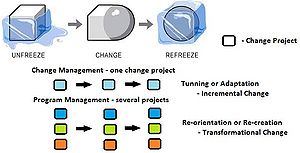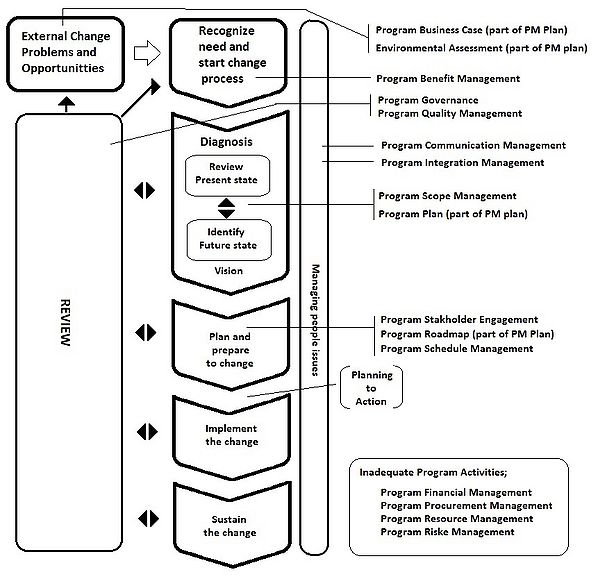The Role of Program Management in an Organisational Change
Developed by Sebbe Sidenius Bull
Revised by Cirkeline Bräuner
ADD REFERENCES, AND PURPOSE/PEOPLE/COMPLEXITY/UNCERTAINCY
In today's rapidly changing society, organisations are going through changes all the time. This causes, that organisations must be able to adapt to new market conditions, changing customer demands and emerging technology. To remain competitive, many organisations go through changes such as process optimisation, cost reduction or technology adoption. These are few examples of changes which affect the entire business, and it is therefore crucial that the change is managed in a successful way to not harm the business.
Organisational change is a huge alteration for any organisation and can be a dawning task if not managed properly. In the context of project management, organisational change refers to any significant alteration in an organisation that affects the way projects are planned, executed, and managed. Project managers must be able to identify the potential impact of organisational changes in their projects and adapt their project management approach accordingly to ensure successful project delivery. In this regard, program management can serve as an effective tool for managing organisational change. With its comprehensive toolbox of evaluative methods, program management offers a structured approach to assessing each potential change project. This toolbox supports change managers in providing an overview of the change project, ensuring efficient project execution, promoting project alignment, evaluating risks, mapping stakeholders and identifying potential benefits. All of these elements work together to facilitate a more effective and efficient change management process.
This article provides an introduction to what change management is and why it is a difficult task to manage. Afterwards, an introduction to program management is given. Then, the two management fields are combined into one common understand of how program management can be applied in organisational change. Lastly, the benefits and limitations of organisational changes using program management is discussed.
Contents |
Change management
What is a change?
What is change management?"
Unfortunately, there is not a single recipe for applying change management in organisations as the subject is simply too complex. However, all organisational change process can be described through the following simple four-step process:
- Assess the need for change: Recognise that there is a problem and identify the source of the problem.
- Decide on the change to make: Decide what the organisation's ideal future state would be and identify obstacles to change.
- Implement the change: Introduce and manage change and decide whether change will occur top down or bottom up.
- Evaluate the change: Compare performance and use benchmarking.
MAKE A BETTER CONNECTION HERE
CHANGE LEWINS MODEL
One of the most simplified way of viewing the change process is through Kurt Lewin's three-step change process [1]. As illustrated in the figure, the change process is divided into three distinct stages; freeze, move and refreeze.
- Unfreeze: The first stage characterises the starting point of the change process where the organisation prepares for the change. This involves creating awareness about the need for the change, identifying current behaviours and to get people to let go of their old ways of thinking and working [2].
- Change: The second stage involves implementing through planning, communication and execution. The objective is to create new ways of thinking and working. During this phase, people must be trained and educated to adopt new methods and behaviours and to overcome any obstacles that may arise [3].
- Refreeze: The third stage addresses making the new change permanent. The objective is to reinforce the new behaviours, ensuring that they become a part of the organisation's culture. During this phase, the focus is on stabilising the new ways of thinking and working, and creating a sense of ownership among employees [4].
Application of Program Management in an Organisational Change
“Program Management is a structured framework for defining and implementing change within an organization” - James J. Leal[5]
As J. Leal point out, the structured framework of Program management is a helping hand to implement several change initiative in an organisation. In order to illustrate this aspect, a range of change projects is setup alongside Lewins Three steps. The generic approach towards a change project, will have effecient execution towards one or two change initiatives, which provide the organisation with an Incremental change. By applying the structure, overview and transparency from Program management will allow the change to become even greater and more comprehensive - which is refered to as a Transformational change. Seen from another perspective, Program management often produce changes in its being - hence it consist of a range of projects, and is used widely in the modern business world.
To further investigate where Program management benefit and have impact on an organisational change - the methods and tools from Program management is presented alongside Steps In the Change Process.
First of all the model illustrate that there is alot of simularities in how the two management fields initiate on a project. Note that Program management will have a range of projects. Secondly, Program management have no tools regarding implementing change. Thirdly, Change management lack the financial approach.
Life Cycle Management has been neglected in the model. Hence, it controls the overall project, ensuring benefits and a controlled ending of the change program. Which is important to sustain the overall change in an organisation.
Contribution of Program Management
Inadequate Program Activities, seen in the figure, is what the change process lack. It is clearly seen that the steps in a change process neglect most of the financial part. Which is very important aspect if an organisation plan to re-orientate or re-create their organisation. Moreover, the wide range of analysis, planning and activity tools within Program management will definitely support the overall change process, by structuring and plan in great detail. This is important, course when an organisation engage in an organisational change you have to make sure that the company survive the change and benefit from it.
Contribution of Change Management
Change management recognise that people within the organisation is one of the most important aspect of a success full change. Why people issues is relevant throughout the entire change program. While most of the structure is done within Program management – Change management on the other hand, have a great deal of knowledge about implementation, and will support the Program managers by addressing the right issues when engaging in an organisational change.
Using the framework from Program management and applying crucial factors recognised by Change management, will definetly ease an organisational change. Thus making the implementation and followup more focused and smooth.
Key Steps In a Change Process - is a generic approach towards change initiatives - and are not suited for a range of change initiatives, hence it lack overview and transparency between change projects. The role of Program management, is hereby to enable Key Steps In a Change Process to arrange several change projects and activities to run simultaneously - a precondition to enable a re-creation or a re-orientation of an organisational change. Moreover, the benefit- and risk- analysis, roadmapping, stakeholder engagement and overview - provided by Program management - serve as a safty line when initiating in an organisational change.
A Program manager and a Change manager cooperating to establish an organisational change is potentially a success, hence each of their expertise support each other. It is important to note, that for example a Change manager in an organisational change, of course plan and review the costs. Counter wise, a Program manager do know about human behaviour. Nevertheless, the focus is different. Why the focus of the two approaches fused together makes a potent cooperation to manage a successfull organisational change.
References
- ↑ [Hayes John (2010). The Theory and Practice of Change Management. 3rd ed. New York: PALGRAVE MACMALLIN. 29.]
- ↑ [Kotter J.P. (1996) Leading Change, BOSTON, Harvard Business School Press]
- ↑ [Hayes John (2010). The Theory and Practice of Change Management. 3rd ed. New York: PALGRAVE MACMALLIN. 26.]
- ↑ [Hayes John (2010). The Theory and Practice of Change Management. 3rd ed. New York: PALGRAVE MACMALLIN. 27.]
- ↑ Project Smart Programme Management A Structured Framework for Implementing Change, James J. Leal, 2009



